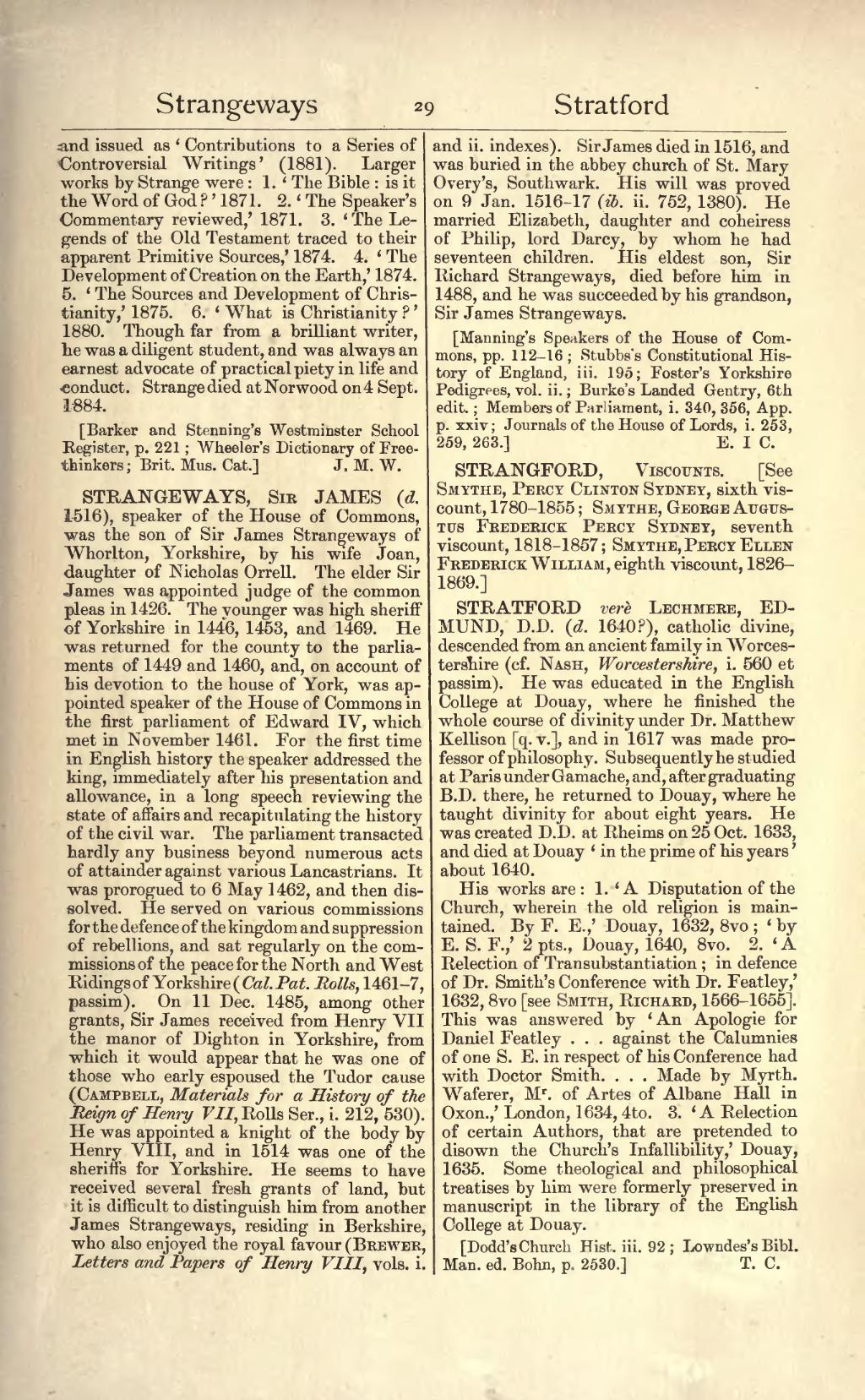and issued as ‘Contributions to a Series of Controversial Writings’ (1881). Larger works by Strange were: 1. ‘The Bible: is it the Word of God?’ 1871. 2. ‘The Speaker's Commentary reviewed,’ 1871. 3. ‘The Legends of the Old Testament traced to their apparent Primitive Sources,’ 1874. 4. ‘The Development of Creation on the Earth,’ 1874. 5. ‘The Sources and Development of Christianity,’ 1875. 6. ‘What is Christianity?’ 1880. Though far from a brilliant writer, he was a diligent student, and was always an earnest advocate of practical piety in life and conduct. Strange died at Norwood on 4 Sept. 1884.
[Barker and Stenning's Westminster School Register, p. 221; Wheeler's Dictionary of Freethinkers; Brit. Mus. Cat.]
STRANGEWAYS, Sir JAMES (d. 1516), speaker of the House of Commons, was the son of Sir James Strangeways of Whorlton, Yorkshire, by his wife Joan, daughter of Nicholas Orrell. The elder Sir James was appointed judge of the common pleas in 1426. The younger was high sheriff of Yorkshire in 1446, 1453, and 1469. He was returned for the county to the parliaments of 1449 and 1460, and, on account of his devotion to the house of York, was appointed speaker of the House of Commons in the first parliament of Edward IV, which met in November 1461. For the first time in English history the speaker addressed the king, immediately after his presentation and allowance, in a long speech reviewing the state of affairs and recapitulating the history of the civil war. The parliament transacted hardly any business beyond numerous acts of attainder against various Lancastrians. It was prorogued to 6 May 1462, and then dissolved. He served on various commissions for the defence of the kingdom and suppression of rebellions, and sat regularly on the commissions of the peace for the North and West Ridings of Yorkshire (Cal. Pat. Rolls, 1461–7, passim). On 11 Dec. 1485, among other grants, Sir James received from Henry VII the manor of Dighton in Yorkshire, from which it would appear that he was one of those who early espoused the Tudor cause (Campbell, Materials for a History of the Reign of Henry VII, Rolls Ser., i. 212, 530). He was appointed a knight of the body by Henry VIII, and in 1514 was one of the sheriffs for Yorkshire. He seems to have received several fresh grants of land, but it is difficult to distinguish him from another James Strangeways, residing in Berkshire, who also enjoyed the royal favour (Brewer, Letters and Papers of Henry VIII, vols. i. and ii. indexes). Sir James died in 1516, and was buried in the abbey church of St. Mary Overy's, Southwark. His will was proved on 9 Jan. 1516–17 (ib. ii. 752, 1380). He married Elizabeth, daughter and coheiress of Philip, lord Darcy, by whom he had seventeen children. His eldest son, Sir Richard Strangeways, died before him in 1488, and he was succeeded by his grandson, Sir James Strangeways.
[Manning's Speakers of the House of Commons, pp. 112–16; Stubbs's Constitutional History of England, iii. 195; Foster's Yorkshire Pedigrees, vol. ii.; Burke's Landed Gentry, 6th edit.; Members of Parliament, i. 340, 356, App. p. xxiv; Journals of the House of Lords, i. 253, 259, 263.]
STRANGFORD, Viscounts. [See Smythe, Percy Clinton Sydney, sixth viscount, 1780-1855 ; Smythe, George Augustus Frederick Percy Sydney, seventh viscount, 1818-1857; Smythe, Percy Ellen Frederick William, eighth viscount, 1826-1869.]
STRATFORD verè Lechmere, EDMUND, D.D. (d. 1640?), catholic divine, descended from an ancient family in Worcestershire (cf. Nash, Worcestershire, i. 560 et passim). He was educated in the English College at Douay, where he finished the whole course of divinity under Dr. Matthew Kellison [q. v.], and in 1617 was made professor of philosophy. Subsequently he studied at Paris under Gamache, and, after graduating B.D. there, he returned to Douay, where he taught divinity for about eight years. He was created D.D. at Rheims on 25 Oct. 1633, and died at Douay ‘in the prime of his years’ about 1640.
His works are: 1. ‘A Disputation of the Church, wherein the old religion is maintained. By F. E.,’ Douay, 1632, 8vo; ‘by E. S. F.,’ 2 pts., Douay, 1640, 8vo. 2. ‘A Relection of Transubstantiation; in defence of Dr. Smith's Conference with Dr. Featley,’ 1632, 8vo [see Smith, Richard, (1566–1655)]. This was answered by ‘An Apologie for Daniel Featley … against the Calumnies of one S. E. in respect of his Conference had with Doctor Smith. … Made by Myrth. Waferer, Mr. of Artes of Albane Hall in Oxon.,’ London, 1634, 4to. 3. ‘A Relection of certain Authors, that are pretended to disown the Church's Infallibility,’ Douay, 1635. Some theological and philosophical treatises by him were formerly preserved in manuscript in the library of the English College at Douay.
[Dodd's Church Hist. iii. 92; Lowndes's Bibl. Man. ed. Bohn, p. 2530.]
